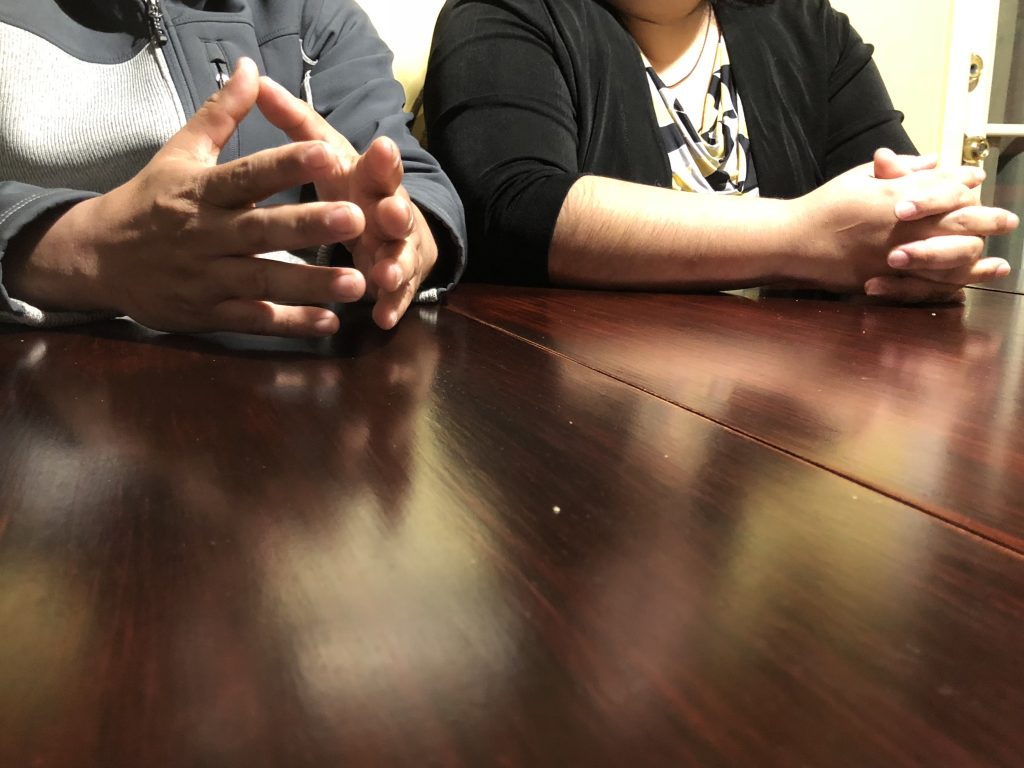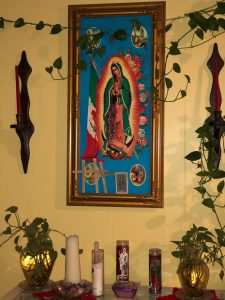This couple decided to remain anonymous and their names have been changed to protect their identities due to the recent ICE [Immigration Customs and Enforcement] raids near their home. When speaking, the quotations are in chronological order. Alejandro and Soledad had originally consented to a video interview. Due to the recent events in their hometown, they rescinded their video consent. During the interview, we could sense the security and love they had for each other. Their continuous trust in each other has gotten them across the Rio Grande and to Western North Carolina. Additionally, their strong Catholic faith has allowed them to maintain their strength despite knowing that they could be separated from their family at any point. This is their story.

The interview was held inside their home. Their home was very humble and had various Christian Catholic symbols. They have a strong Catholic faith that has helped them through very troubled moments in their lives. As we stated above, they had originally consented to a video interview. However, due to the recent tension in their home town, they decided to remain anonymous. They insisted on doing the interview together. As they interview progressed we realized their story needed to be told together because it started together.
Their journey, as a married couple, began when they very young. Soledad was 19 and Alejandro was 20 years old. They were very young parents. Alejandro was very intelligent and an engineer in Mexico. He still attended school to continue his education. Unfortunately, he could not receive any promotions, due to the lack of opportunities in Mexico. So while he was a very intelligent engineer, his bosses were unable to give him the necessary financial compensation to keep a stable family.
The decision to come to the United States was a tough one. They did not have any family in Western North Carolina, nor did they know who could bring them. They believed they could stay in Mexico and just make it by day by day. But one day, it all changed.
Soledad: “We found out that we were expecting our second child. We were going through many difficulties providing for one child.”
Alejandro: “The lack of responsibility. Aside from the fact that we were young, the economy did not help our financial stability of our home. The peso had lost value and that made everything [providing for the home] more difficult for us. That was the moment we had to decide to look for another place to provide better stability. Especially now that there was another member coming into our family.”
Soledad: “That was when we decided to come here [The United States].”
They had made the life changing decision to immigrate to the United States with their five-year-old son. The difficulties in crossing the border alone are unimaginable. Having to travel with your whole family is unfathomable.
Soledad: “It was very difficult for me because, I was 5 months pregnant at the time. It was our first time [crossing the border]. It was an intimidating experience. There was a lot of stress, fear and uncertainty. We didn’t know what to expect. Above all, you are running the risk of being caught by immigration officers at any moment. Aside from that, near the borderlands there is a lot of vandalism, gangs and criminal activity. There was also that fear of being found by any members of those groups. My husband had a near death experience with my son, who was only five years old at the time. He was mugged while having a knife to his throat. That is what has kept us here for the past 20 years.”
They have lived here for 20 years. Twenty years is a lifetime. A whole lifetime of not being able to return to your homeland.

We wanted to know if staying long-term was their plan all along. Was it a matter of careful planning or chance that they had stayed this long?
Both: “We initially were going to stay for 3 years.”
Soledad “I think most immigrants that come here come with the idea of only staying for a short amount of time. A couple years before, men were the only ones that would come [to the United States]. They would come and work when they needed money and then go back to their homeland. There was a point, when we came around 20 years ago, that the men were not alone they would bring their families or send for them. That is when the Hispanic community began to grow here [Western North Carolina]. I remember at that time there was only one Mexican store [in Western North Carolina], there were a few Hispanics around, but there weren’t a lot [of Hispanics]. So, suddenly 20 years ago it [the Hispanic community] began to grow. There were more families.”
[Question from minute 4:55] “So after the 3 years, you decided to stay in Western North Carolina?”
Alejandro: “There comes a point [of realization] when your whole family tells you it is getting more difficult [financially], there is more violence, more this and more that. Then, there is really nothing worth going back to. So, you begin to analyze everything and realize that okay, if I go back I will be risking my family’s safety. Even though it is my home country, I will be risking my family’s life. Here, if I have a job and provide for my family, there is more security. I can walk on the street with my children without a danger of being mugged or harm being done to us.”
[Question from minute 5:45] “In spite of the current political climate, why have you decided to stay here?”
Soledad explains that three out of their four children were born in the United States. Their oldest son was 5 years old when they left Mexico and does not remember anything from Mexico. Although their eldest son was born in Mexico, 20 years of his life has been lived in the United States. Their children have all been raised as Americans. “The roots have already been established here and the other three are citizens.”
[Context from minute 6:15] Soledad explains that her children are Americans. She says that maybe one day they will want to learn about their heritage, but they do not know how to live in Mexico. Just like their son assimilated, Soledad and Alejandro also decided to assimilate.
Soledad: ‘That is something that we have never thought of nor, was it in our plans. But, here we are. After we are here the second challenge is to learn the language. It is difficult but we have learned to adapt. Adapting means that it shouldn’t matter what situation arises we are human beings, that most of us, from Mexico South and Central America, all have a story constant struggle.”
Alejandro: “Assimilating or adapting to another culture can be beautiful experience. We cannot be closed minded. Yes, we are proud of our roots and culture but, that does not impede us to not learn another culture. To learn this culture that also has its own customs and traditions. We have learned how to coexist with them. We are here. We must learn from them. We cannot close ourselves to say, ‘I only speak Spanish’ or ‘I only celebrate 5 de Mayo’. No [we cannot do that].”
The fact that they are trying to assimilate was a shock to me. We, as privileged students, and knowing the effects of colonization, were always against the idea of assimilation. More surprising, however, was the fact that they were trying to assimilate to a type of government that has created a narrative of undocumented immigrants of being a burden. Many believe that undocumented immigrants take and ‘mooch’ off the system.
Soledad: “Well us, in our 20 years of being here, maybe they are not a lot but..”
Alejandro: “Every cent that we have made here [the United States] has also been spent here. So, every cent that we have made and spent here, for every penny, they are charging you taxes. We don’t have access for income tax return. However, for us, having a job, being able to provide for our families is more than enough for us.”
Soledad: “What these people [people that think that undocumented immigrants ‘mooch’ the system] most of us [Mexicans] are too prideful to ask for charity from anyone. That is how we are. What you eat is what you earn. Your clothes, shoes and everything else must be earned with your own sweat. So, most of us are too prideful to depend on any institution. We can’t anyway.”
Alejandro: “If you don’t work; you don’t eat. That is how we live here. Furthermore, if you don’t have documents you don’t have access to many benefits. We do not have the luxury of saying ‘oh, 4th of July is coming we should take a vacation.’ No, I have to work on that day because if I don’t work I don’t eat.”
They explained that if they do not work they do not eat. That is a very strenuous schedule. They then explained that they work longs days.
Alejandro: “I don’t know. Maybe, 10 hours. It varies because it depends on the type of job I am doing. We must do all types of work. What I do is general maintenance. What they call a ‘handyman’ I can be working on a yard, laying down mulch, fixing a garden, fixing the plumbing, painting, whatever they might need. There will be days that I work 6-8 hours but there will also be days that I work 16 hours.”
The last portion of our conversation was spent speaking of their future. Being that their future is so uncertain, and they know that living in uncertainty can change at any moment, they decide not to commit to long term plans, or goals.
Soledad: “We have learned not to make plans. We have learned to live in the moment however God will allow us to live.”
Alejandro: “We strongly believe that you should treat others the way you want to be treated. Then, the blessings will return to you or members of your family.”